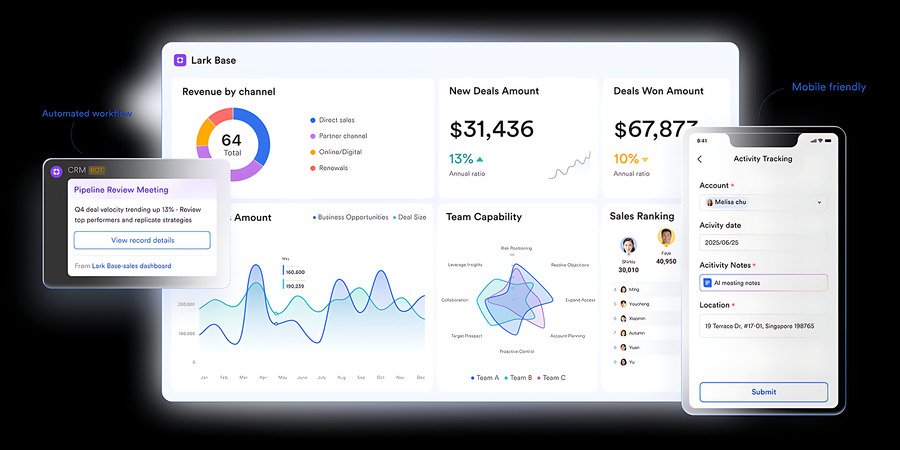In the rapidly evolving landscape of modern business, Artificial Intelligence (AI) has emerged as a transformative force, reshaping industries and redefining the boundaries of what’s possible. As we delve into the intricate world of AI in business, it’s crucial to understand not just its potential, but how to harness it effectively. This article explores the practical applications of AI in various business domains and provides insights on how companies can leverage this technology to stay competitive in an increasingly digital world.
Understanding AI in the Business Context
AI, at its core, is about creating systems that can perform tasks that typically require human intelligence. In the business realm, this translates to tools and processes that can analyze vast amounts of data, recognize patterns, make decisions, and even learn from experiences—all at a speed and scale unattainable by human capabilities alone. The integration of AI into business operations isn’t just about adopting new technology; it’s about reimagining how businesses function. From streamlining operations to enhancing customer experiences, AI has the potential to touch every aspect of an organization.
Key Areas Where AI is Transforming Business
- Customer Service and Engagement
AI-powered chatbots and virtual assistants are revolutionizing customer service. These intelligent systems can handle a multitude of customer queries simultaneously, 24/7, providing instant responses and freeing up human agents to deal with more complex issues. Moreover, AI can analyze customer data to provide personalized recommendations and experiences, significantly enhancing customer satisfaction and loyalty. - Data Analysis and Decision Making
One of AI’s most powerful applications in business is its ability to process and analyze vast amounts of data quickly. Machine learning algorithms can identify trends, predict outcomes, and provide insights that help in making more informed business decisions. This capability is particularly valuable in areas like market analysis, risk assessment, and strategic planning. - Process Automation
AI is taking automation to new heights. Robotic Process Automation (RPA) combined with AI can handle not just repetitive tasks but also more complex processes that require decision-making capabilities. This leads to increased efficiency, reduced errors, and significant cost savings. - Product Development and Innovation
AI can accelerate the product development cycle by analyzing market trends, customer preferences, and historical data to predict what products or features will be successful. It can also assist in the design process, generating and testing multiple iterations quickly. - Marketing and Sales
AI is transforming marketing strategies by enabling hyper-personalization. It can analyze consumer behavior, predict purchasing patterns, and tailor marketing messages to individual preferences. In sales, AI can identify high-value leads, optimize pricing strategies, and even predict future sales trends. - Supply Chain and Logistics
AI algorithms can optimize supply chain operations by predicting demand, managing inventory levels, and even routing deliveries more efficiently. This leads to reduced costs, improved delivery times, and better overall supply chain resilience. - Human Resources
In HR, AI is being used for everything from resume screening and candidate matching to employee engagement analysis and predictive attrition models. It’s helping companies hire more effectively and manage their workforce more efficiently.
Implementing AI in Your Business: A Strategic Approach
While the potential of AI is vast, implementing it successfully requires a strategic approach:
- Identify Clear Objectives
Before diving into AI, clearly define what you want to achieve. Are you looking to improve customer service, streamline operations, or enhance decision-making? Having clear objectives will guide your AI implementation strategy. - Start Small and Scale
Begin with pilot projects in areas where AI can have a significant impact. This allows you to test the waters, learn from the experience, and gradually scale up your AI initiatives. - Ensure Data Quality and Accessibility
AI systems are only as good as the data they’re trained on. Ensure you have access to high-quality, relevant data and that it’s properly organized and accessible. - Invest in the Right Talent
Building an AI-capable workforce is crucial. This might involve training existing employees, hiring AI specialists, or partnering with AI service providers. - Address Ethical Considerations
As you implement AI, be mindful of ethical implications. Ensure your AI systems are transparent, fair, and comply with relevant regulations, especially when handling sensitive data. - Foster a Culture of Innovation
Successful AI implementation often requires a shift in organizational culture. Encourage a mindset that embraces innovation, continuous learning, and adaptation. - Integrate AI with Existing Systems
For AI to be truly effective, it needs to be integrated with your existing IT infrastructure and business processes. This integration should be planned carefully to ensure seamless operations.
Overcoming Challenges in AI Adoption
While the benefits of AI are clear, businesses often face challenges in adoption:
- Resistance to Change: Employees may be wary of AI, fearing job displacement. Address these concerns through clear communication and by emphasizing how AI will augment rather than replace human roles.
- Technical Complexity: AI systems can be complex to implement and maintain. Consider partnering with AI experts or using AI-as-a-Service platforms to overcome technical hurdles.
- Data Privacy and Security: As AI systems often deal with sensitive data, ensuring data privacy and security is paramount. Implement robust data protection measures and comply with relevant regulations.
- Cost Considerations: While AI can lead to long-term savings, initial implementation costs can be significant. Carefully assess the ROI and consider phased implementation to manage costs.
The Future of AI in Business
As AI technology continues to evolve, its impact on business is only set to grow. We’re likely to see more sophisticated AI applications, greater integration with other emerging technologies like IoT and blockchain, and AI becoming an integral part of business strategy rather than just a tool.
Businesses that successfully leverage AI will likely see improvements in efficiency, innovation, and competitiveness. However, it’s important to remember that AI is not a silver bullet. Its successful implementation requires careful planning, strategic thinking, and a commitment to continuous learning and adaptation.
Conclusion
The integration of AI into business operations represents a significant opportunity for companies to innovate, improve efficiency, and gain a competitive edge. By understanding the potential applications of AI, adopting a strategic approach to implementation, and addressing challenges head-on, businesses can navigate the AI landscape successfully.
As we move further into the age of intelligent enterprise, the question is no longer whether to adopt AI, but how to do so most effectively. The businesses that will thrive are those that view AI not just as a technological tool, but as a catalyst for reimagining their entire business model and operations. In this new era, the fusion of human creativity and artificial intelligence will unlock unprecedented possibilities, driving business growth and innovation to new heights.
















